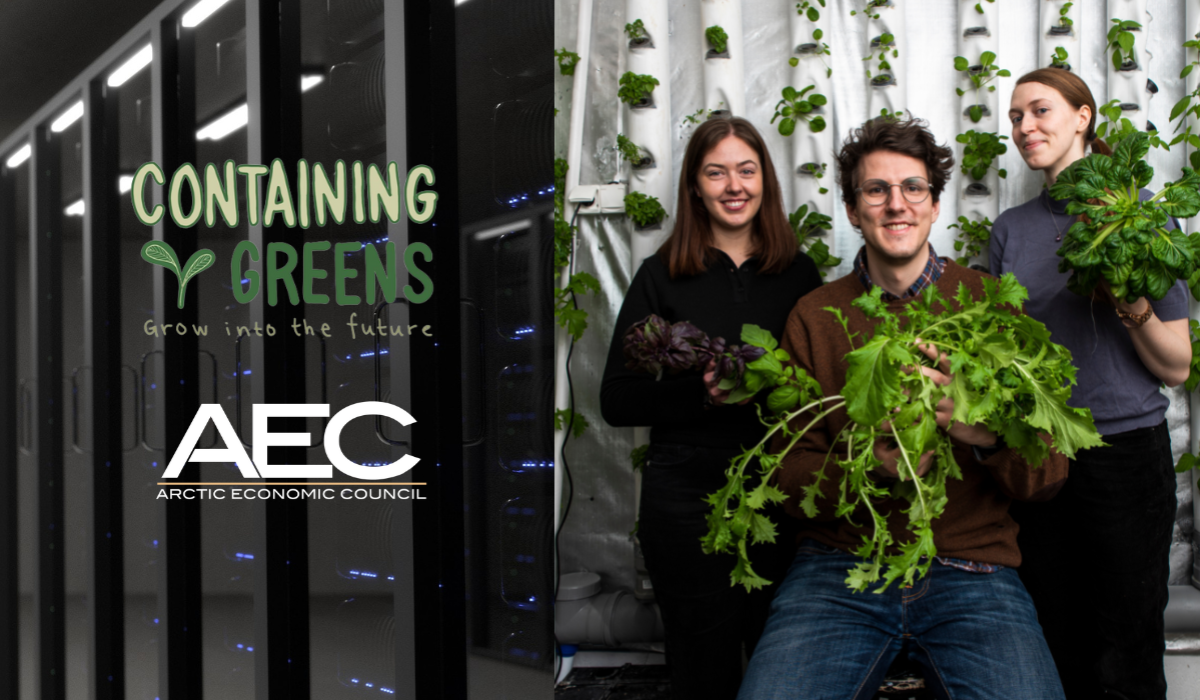
Arctic start-up: From waste heat to vegetables
Arctic Sweden is a vast territory, where average temperatures are low, and the electricity is affordable and green. These unique conditions together with power grid and fibre capacity infrastructure, make the region an attractive location for hosting data centres for big international companies. Since 2013 Swedish city of Luleå has been hosting Facebook data centres, making the Swedish Arctic a major hub for European data traffic.
From student to entrepreneur
Luleå is also home to the northernmost university in Sweden, the Luleå University of Technology. This is where Moa Johansson, Adrian Mellgren and Ellinor Emilsson, students at a time, got an idea to utilize the waste heat from the data centres for growing herbs and vegetables in local greenhouses.
“All began in 2020 during the summer job with the university. We had a central question, which was to find a solution to the food security issue Sweden will face in the future, which would also meet the UN global goals for 2030. Already at the first days, we realized the huge challenge Sweden is facing. The eating habits have changed, but the way of producing has not been keeping up,” explains Moa Johansson, today’s CEO of Containing greens AS.
Food self-sufficiency in the Swedish Arctic
Harsh climate conditions in the Arctic make it challenging to produce plant-based foods. Except for wild herbs and berries, the majority of the plant-based foods are imported from the South by plane. In Arctic Sweden, over 90 percent of the fruits and greens are imported. This naturally increases the demand in locally produced greens. People want available and affordable fresh, high-quality food. At the same time, bringing fresh vegetables to the table should be climate-friendly without an excessive carbon footprint.
Growing greens in the Arctic is a solution that lies on the surface. But how does one actually do it in cold continental climate, with freezing winters and short daylight?
Agtech start-up
In 2020, Moa Johansson together with fellow students partnered up with the Research Institute of Sweden and started first experiments with the waste heat from the servers. The positive results did not make them wait long. After six weeks they got first plants available for sale.
“The result of the work at the end was too good to give up, there was a need to create this company,” says Moa Johansson.
Today Containing Greens has developed cultivation modules with hydroponic systems, where they grow plants directly in water instead of soil. They use the waste heat from server halls making cultivation possible even during the wintertime.
“Our products were commercialised one month after the first experiment and can be currently purchased at two supermarkets and also in some restaurants. We closely work together with another start-up, which is selling local products from all Northern Sweden. The distribution chain is expanding, and so is the production.”
In 2023, Containing Greens is moving to bigger facilities, since they can’t keep up with the high demand for fresh vegetables.
“Our speciality is mainly kale, but we also do all types of herbs such as parsley, basil, and cilantro. We will start growing strawberries, but mostly for the fun of the experience,” adds Moa Johansson.
Cryptomining helps to grow more greens
Unique Arctic conditions made Sweden an important host country for IT companies. Some of them like Genesis Mining, a mining company for cryptocurrency, are already partnering up with the municipality and will host the Containing Greens test facility.
“We have been able to work with other actors for production and distribution, but now we need to do it on a bigger scale, and that’s the next step,” concludes Moa Johansson.
Being a young entrepreneur in the Arctic
Containing greens is a success story of young entrepreneurship from the Arctic.
“If you have a business idea, you should really try it out, and not wait for better weather. I would just say go for it. Programs as we had with the university in Luleå are really good to create SMEs. It provides you the tools for how to run a business, and I think more people and more universities should follow up with that.”